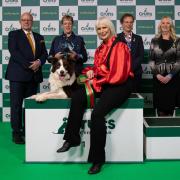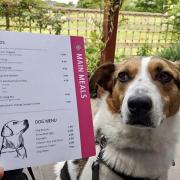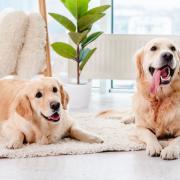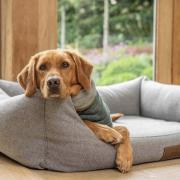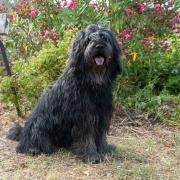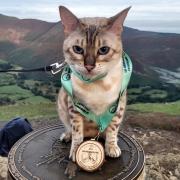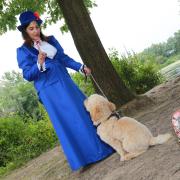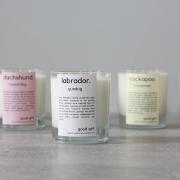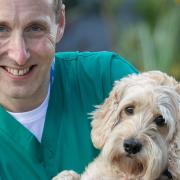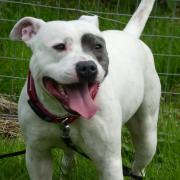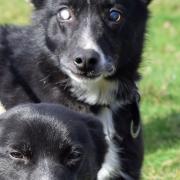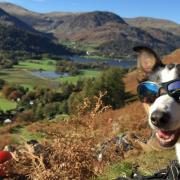An award winning breeder is determined that Lakeland Terriers remain a hot topic

Born and bred in Egremont, on the western edge of the Lake District, Alan Johnston has spent most of his life working with terriers. A builder by trade, Alan is now retired but life has never been busier. As well as breeding and showing his dogs, he dedicates his time to sharing his knowledge and expertise, from local clubs and shows to venues in America and Australia. He is fiercely competitive and proud of his little pack of Lakeland Terriers and has bred many champions.
Often described as friendly but fearless, the Lakeland Terrier has been part of Lake District life since the 1700s. It is one of the oldest of the modern terrier breeds and is believed to be the descendant of other breeds such as the Back and Tan, Welsh, Border and Fox terriers. These tenacious terriers were developed to run with packs of hounds over steep and rocky terrain and to go to ground after the foxes that preyed on lambs.
They were also excellent ratters and used to hunt down vermin. The breed's small size, stamina and bold personality made it the ideal dog to go hunting in hard to reach places. Its double coat - harsh topcoat with soft undercoat - meant it could meet all the challenges Lake District weather has to offer.
'They are now a vulnerable breed but Egremont was once the hub for Lakeland Terriers,' Alan said. 'My grandad, Alf Johnston, started Oregill Kennels in 1921 and in the 20s and 30s there were over 20 breeders in the town; now there's only me.

'There were all sorts in the mix of the early working terrier and each region had its own type. The dogs were formerly known by the name of the hunt that they followed such as Ullswater or Coniston or as coloured working terriers until they were named Lakeland Terriers when the Lakeland Terrier Association started in Keswick in 1912. Grandad bred dogs for the Mockerkin pack and was able to show his dogs up and down the country and was a judge at Crufts in 1934. The first red champion he bred was Oregill Captain and every Lakeland Terrier in the lakes will go back to him.
'Grandad died in 1962. I was 12 at the time and a month later, when I became 13, I was given my first puppy, Oregill Heritage. By the age of 15 I had left school and that's when I started breeding. Luckily, I had a mentor, Lenny Farron, who showed me the ropes. I won my first championship in 1980.'
Since then Alan and his wife Angela have bred many winning dogs at Oregill Kennels which is currently the oldest kennel in the world for the breed. They are passionate about showing their terriers, and their large collection of rosettes, cups and awards are testament to their skills and dedication although Alan admits that, at 70, it's probably time to take on fewer commitments.
Last year three-year-old Hot Topic, informally known as Totty, came away from Crufts with a top prize.
Angela said: 'She won a championship at Crufts. To make a dog a champion you have to win three challenge certificates. She is a fifth generation direct champion which is something quite remarkable - all of the winners have been Oregill bred and mated with Oregill dogs. The first, her great-great grandmother, was Oregill Bunting then great grandmother Oregill Elspeth followed by grandmother Oregill Pocket Rocket and mother, Oregill In the Buff.'
With their wealth of knowledge, the couple have judged many competitions over the years, including Crufts. 'I do judge but Alan has judged more including Crufts, America, The National Terrier Club and most championships,' says Angela. When judging and lecturing in America, Alan has been known to go that extra mile to give a true flavour of the Lake District in times gone through dressing in traditional clothes including a tweed jacket, moleskin trousers and waistcoats and huntsman's boots.
'I usually accompany Alan when he does his seminars because sometimes, he doesn't know when to shut up,' laughs Angela.
Alan's seminars, no doubt presented with Cumbrian wit and wisdom, cover the history of the breed, their role in the fells and valleys of the Lake District and later developments when their fame was bolstered through being formally recognised by the Kennel Club in 1921. Alan is clearly passionate about his subject and has an abundance of photographs, both past and present, to illustrate his lectures.
The Lakeland Terrier is now classed as a vulnerable native breed by the British Kennel Club. Angela explains: 'All English blood lines go out to America, but breeders are dying out there too. We obviously don't want the breed to become extinct but perhaps it's better that there aren't too many. They are quite a niche dog that need a certain sort of home.
'They are very good with people and children but are very independent and can bring challenges. They don't always live harmoniously with other dogs and aren't very patient with cats and rodents. We don't advertise our kennels, but we have lots of visitors from all over the world and we feel that if they have taken the trouble to find us then they are genuinely interested.'




